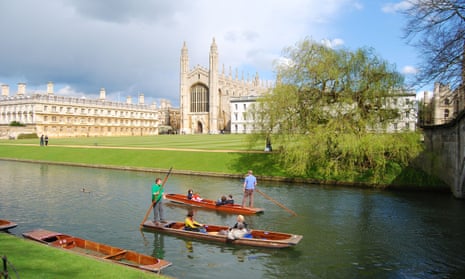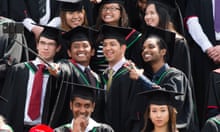The University of Cambridge is celebrating the largest single donation from a British donor in recent history, after announcing a gift of £100m from the financier David Harding to support students.
Harding, a physics graduate from Cambridge who became a billionaire and successful hedge fund manager, has pledged that some of the funds will go to promote access for students from disadvantaged and minority ethnic backgrounds.
The donations from the David and Claudia Harding Foundation will include £79m in scholarships and aid to postgraduate PhD students, with a further £20m as financial support for undergraduates. The final £1m will help fund Cambridge’s access programmes aimed at attracting disadvantaged students.
“This extraordinarily generous gift from David and Claudia Harding will be invaluable in sustaining Cambridge’s place among the world’s leading universities and will help to transform our offer to students,” said Stephen Toope, Cambridge’s vice-chancellor.
The fund to support postgraduate students, to be known as the Harding Distinguished Postgraduate Scholars Programme, will begin this year. Cambridge said that the programme will fully fund, in perpetuity, more than 100 doctoral students in residence at any one time.
“Scholarships will be available to the most talented students for research in any discipline and the successful candidates will be offered places at applicable Cambridge colleges,” the university said in a statement.
Harding – whose hedge fund Winton Capital is said to invest more than £20bn – said: “Claudia and I are very happy to make this gift to Cambridge to help to attract future generations of the world’s outstanding students to research and study there.
“Cambridge and other British centres of learning have down the ages contributed greatly to improvements in the human condition and can continue in future to address humanity’s great challenges.”
A recent investigation by the Guardian found that Cambridge is the wealthiest university in the UK, with a combined £11.8bn in identifiable assets, including £4.9bn held by the central university alone, and £6.9bn held by individual colleges.
Harding, 57, studied at St Catharine’s College, Cambridge, graduating with a first-class degree in 1982, before working in the City of London as a stockbroker. In 1997 he founded the Winton Group, and he remains its chief executive.
The financier’s most recent high-profile donation was an estimated £3.5m to help fund the Britain Stronger in Europe campaign before the 2016 referendum.
The Hardings have previously pledged £20m to the Winton programme for physics at Cambridge university’s prestigious Cavendish laboratory, as well as donations to other leading institutions such as London’s Science Museum, the Crick Institute, and funding for the Harding Centre for Risk Literacy at the Max Planck Institute for Human Development in Berlin.
In historical terms the Harding donation, despite its nominal size, pales in comparison to the $10m donated to Scotland’s universities by Andrew Carnegie in 1902, or the legacies given to Oxford by Cecil Rhodes in 1903, with £4m to establish the famous scholarship that bears his name worth closer to £500m today.
In 2000 the Bill and Melinda Gates Foundation announced a £130m gift to Cambridge to establish a scholarship fund, the largest single gift of the modern era.
In 2012, Michael Moritz and Harriet Heyman donated £75m to Oxford to found the Moritz-Heyman scholarships for disadvantaged undergraduates, with the pair also donating £25m to Christ Church college in 2008.
The Canadian investor John McCall MacBain is also likely to have matched Harding’s donation, having made a £75m donation to the Rhodes scholarship trust in 2013 with matching additions that have probably taken it to about £100m.









